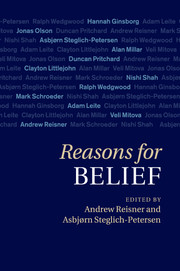Book contents
- Frontmatter
- Contents
- Contributors
- Preface
- Introduction
- PART I NORMATIVE REASONS FOR BELIEF
- 1 How to be a teleologist about epistemic reasons
- 2 Is there reason to be theoretically rational?
- 3 Epistemic motivation
- 4 Error theory and reasons for belief
- 5 Can reasons for belief be debunked?
- PART II REASONS AND EPISTEMIC JUSTIFICATION
- References
- Index
1 - How to be a teleologist about epistemic reasons
Published online by Cambridge University Press: 05 July 2011
- Frontmatter
- Contents
- Contributors
- Preface
- Introduction
- PART I NORMATIVE REASONS FOR BELIEF
- 1 How to be a teleologist about epistemic reasons
- 2 Is there reason to be theoretically rational?
- 3 Epistemic motivation
- 4 Error theory and reasons for belief
- 5 Can reasons for belief be debunked?
- PART II REASONS AND EPISTEMIC JUSTIFICATION
- References
- Index
Summary
INTRODUCTION
According to the teleological conception, reasons are value-based. Whether someone has reason to Φ depends on the value of the result of Φ-ing, or the intrinsic value of Φ-ing itself (Scanlon 1998: 84). Accordingly, on the teleological conception of reasons for belief, whether someone has reason to believe some particular proposition p on some particular occasion depends on the value of the result of believing p, or the intrinsic value of believing p, on that occasion. Although this basic tenet of the teleological account of reasons for belief has seemed plausible to many, and a number of attempts have been made at fleshing it out in detail, it remains controversial whether it can be made to work.
We can distinguish between two distinct challenges, or broad categories of challenges, for the teleological conception of reasons for belief. On the one hand, there is the problem of explaining why, on the teleological account, one couldn't have reason to believe a proposition that is not supported by evidence. If reasons for belief are reasons that obtain in virtue of the value of the relevant belief, why does the pleasantness (or some other non-epistemic property of value) of believing a particular proposition not provide a reason for holding it? There are those, of course, who accept the possibility of such non-epistemic reasons for belief.
Keywords
- Type
- Chapter
- Information
- Reasons for Belief , pp. 13 - 33Publisher: Cambridge University PressPrint publication year: 2011
- 46
- Cited by



